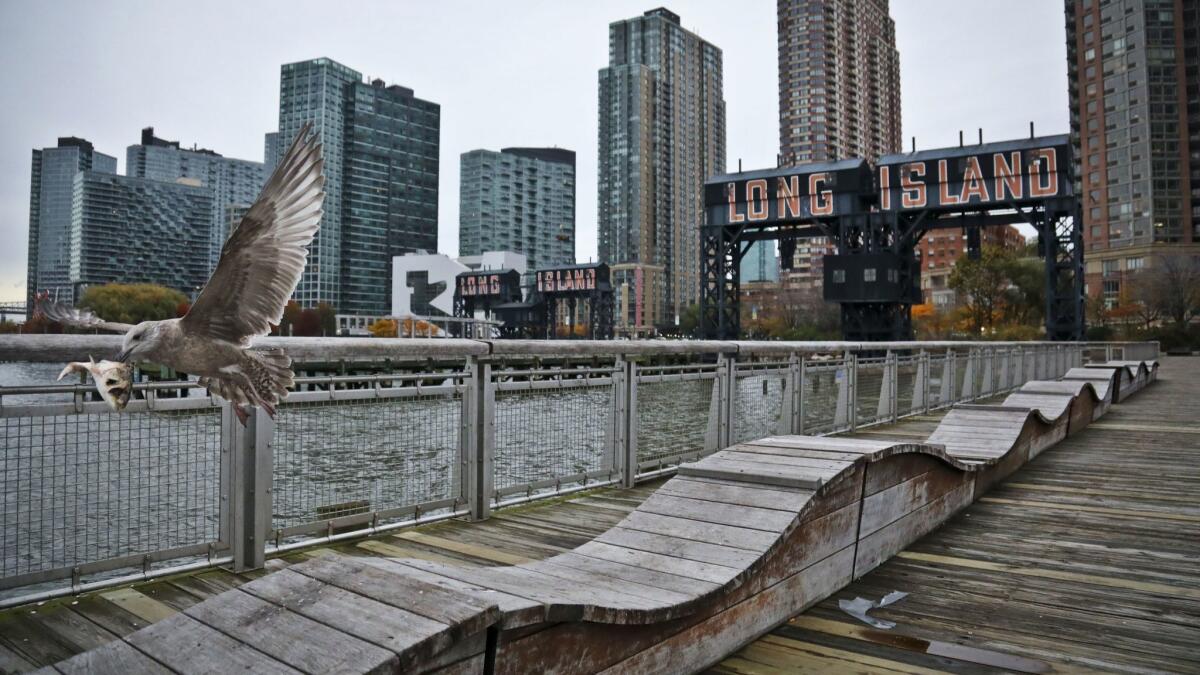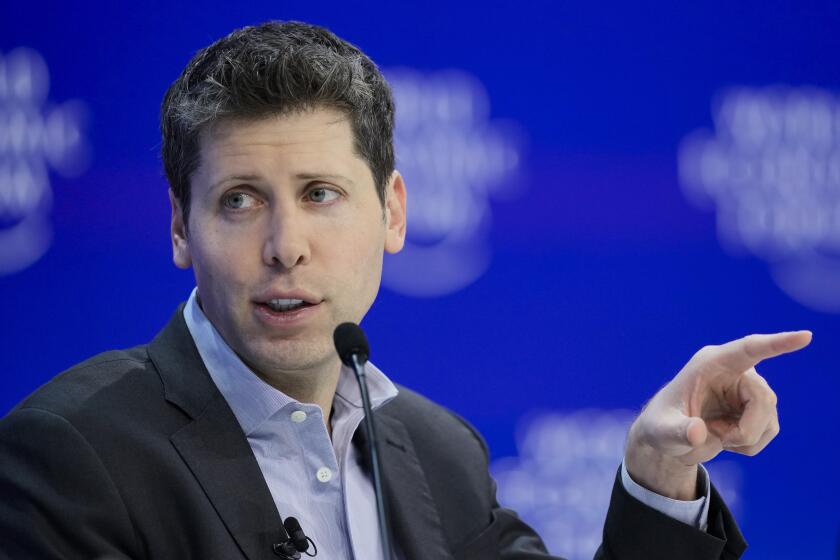Amazon cancels plan for New York headquarters after local backlash

- Share via
Reporting from Long Island City, New York — When Amazon.com launched its nationwide search for a location for a second headquarters last year, cities eagerly lined up, promising primo real estate and plush tax incentives.
But when the e-commerce giant chose the Long Island City neighborhood of New York’s Queens borough as one of its new hubs, the reception was not nearly as welcoming.
Though some locals and politicians hailed the plan and the 25,000 new jobs it would bring, others questioned giving $3 billion in incentives to a company run by the world’s richest man, Jeff Bezos, and asserted Amazon had not done enough to alleviate its impact on the city.
On Thursday, Amazon made clear that it had heard the outcry, and was in no mood to fight it, abruptly announcing it would abandon the Long Island City plan. Amazon said it is not searching for a replacement city.
The decision underscored how, in certain locations at least, there is a heightening skepticism to the decades-old practice of governments showering big companies with perks to gain the added tax revenues and employment the firms provide.
“This is a stunning development, with Amazon essentially giving in to vocal critics who bemoaned the tech giant’s decision to set up a new substantial outpost in Long Island City,” Mark Hamrick, senior economic analyst at Bankrate.com, said in an email.
The Seattle-based company had conducted a much-ballyhooed search for its second headquarters, dubbed HQ2, and in November it announced a decision to split that second headquarters — and its 50,000 jobs — between Queens and Arlington, Va., near Washington, D.C.
New York’s selection was cheered by New York City Mayor Bill de Blasio and Gov. Andrew Cuomo — who had vowed he would change his first name to “Amazon” were it to help the state win the headquarters.
But other state legislators and community activists objected to the deal without more modifications, saying Amazon had not made sufficient efforts to offset the prospect of higher housing prices and worsening public-transportation woes, among other problems, in exchange for tax breaks and other incentives.
Cuomo and De Blasio had pledged to keep fighting for the project despite the opposition — the deal “was probably the greatest economic transaction in 50 years in this state,” Cuomo had said — but to no avail.
Critics of Amazon in New York objected not only to the notion of subsidies for the company, which had revenue of $233 billion last year, but also to the economic and social disruption they feared. Opponents went door to door warning people in Queens of rent hikes, displacement and other problems.
The critics prevailed in New York, Amazon said. “For Amazon, the commitment to build a new headquarters requires positive, collaborative relationships with state and local elected officials who will be supportive over the long term,” the company said in a statement. It expressed appreciation for Cuomo and De Blasio’s efforts and said it was “disappointed” to scrap its New York plans.
Rep. Alexandria Ocasio-Cortez — a Democrat whose district neighbors the one containing Amazon’s proposed Long Island City site — cheered Thursday’s news. “Today was the day a group of dedicated, everyday New Yorkers & their neighbors defeated Amazon’s corporate greed, its worker exploitation, and the power of the richest man in the world,” she said on Twitter.
The head of the New York City Council, Corey Johnson, said he looks forward to working with companies that are “willing to engage with New Yorkers.”
“New York City is the world’s best place to do business,” Johnson said in a statement. “I hope this is the start of a conversation about vulture capitalism and where our tax dollars are best spent.”
The New York situation stood in contrast to the warm reception Amazon received in Virginia, where Gov. Ralph Northam signed a law last week authorizing up to $750 million in state subsidies for the Amazon facilities there.
Some observers also saw Amazon’s struggle in New York as a national litmus test for how populist forces were increasingly objecting to the local effects of corporations and politicians willing to provide them with tax breaks and other subsidies.
Others said the opposition was somewhat unique to New York and would come at a price.
“Now, all of the prospective employees who would have otherwise been hired, all of the small businesses that would have benefited from Amazon’s Queens presence, and indeed state and local governments looking forward to tax revenues, as well as the broader community, will miss out from improved growth prospects,” Hamrick said.
Public polling soon after the deal was announced suggested it was more popular in Queens than it was in the wealthier parts of the city, and had greater support among black and Latino respondents than white respondents.
The heavy union element in Queens may have played a role in Amazon’s decision, just as it did when “Walmart gave up attempts to build a store in New York City following similar union and community opposition” a few years ago, said Rebecca Kolins Givan, an associate professor at the Rutgers School of Management and Labor Relations.
On top of the headquarters’ impact on housing and transportation, many New Yorkers felt most of the high-paying jobs would be taken by Amazon workers transferring to Queens and “not available to the people already living there,” she said. “This felt like a 10-ton gorilla coming in from the outside and throwing its weight around.”
Some developers, property owners and local businesses had begun planning for an influx of well-paid workers.
Mirza Mosihur Rahman, the CEO of a small residential developer called Alib Inc., is in the middle of buying land to build a 35- to 40-unit condominium complex in the nearby neighborhood of Astoria. Before Amazon announced its Long Island City headquarters, the land was priced at about $800 per square foot, he said; after the announcement, it jumped to about $1,200 per square foot.
Now he must either renegotiate the price or reconsider the deal entirely, he said: “It’s not a big project, but now we have to give it a second thought.”
Thursday’s news might also let some air out of apartment prices. In the five weeks after Amazon said it would open a Long Island City headquarters, 18.8% of the apartments in that neighborhood that were listed for sale on the website StreetEasy saw a price increase, and sellers of more than 75 homes on the site began to advertise their buildings’ proximity to the proposed Amazon location, StreetEasy said. In the five weeks before the November announcement, there were no price increases, it said.
“We expect asking prices and buyer interest to fairly quickly revert back to their pre-announcement levels,” said StreetEasy economic data analyst Nancy Wu.
J. Alom, a food truck proprietor who lives in Long Island City and was operating a halal food cart there Thursday, was disappointed when The Times informed him of Amazon’s decision. “Oh, God, I thought it was going to be more business for me,” he said in Bengali.
More than 200 cities or regions had applied to land Amazon’s second headquarters. The company narrowed the list a year ago to 20 locations, including Los Angeles. Amazon watchers speculated that the winner would be in the Eastern United States but did not expect the headquarters to be divided between two locations.
When Amazon selected New York and Arlington, some in the Los Angeles area expressed relief.
“Thank God,” Christopher Thornberg, founding partner of Los Angeles’ Beacon Economics, a go-to consultancy for California officials, said at the time.
Economic development is “best done by helping existing businesses grow, and by building more housing and infrastructure,” he said. “Not by spending millions of dollars in subsidies and countless man-hours chasing a monster like Amazon. Why do it? So politicians can have bragging rights.”
Amazon said Thursday that it doesn’t intend to search for another HQ2 location “at this time,” but that it will expand in U.S. and Canadian locations where it already has offices and hubs. That will include adding to its more than 5,000 employees in the New York City boroughs of Brooklyn, Manhattan and Staten Island, it said.
More to Read
Inside the business of entertainment
The Wide Shot brings you news, analysis and insights on everything from streaming wars to production — and what it all means for the future.
You may occasionally receive promotional content from the Los Angeles Times.












